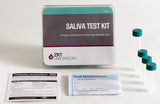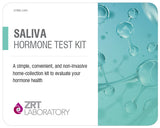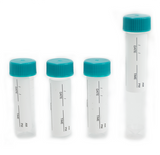Female Hormone Profile III – Comprehensive At-Home Saliva Hormone Test for Women
The Female Hormone Profile III is a comprehensive at-home saliva hormone test that measures eight key hormones essential for a woman’s health, energy, fertility, and emotional well-being. This accurate and non-invasive test provides valuable insight into your body’s hormonal balance, stress levels, and reproductive function — all from the comfort of your home.
What the Test Measures
This test analyses eight essential hormones that influence mood, metabolism, fertility, and stress response:
- Estradiol (E2): The main form of estrogen produced by the ovaries. It regulates the menstrual cycle, supports bone and heart health, and influences mood.
- Testosterone (T): Present in small amounts in women, it supports libido, muscle tone, and energy levels.
- DHEAS (DS): A precursor to estrogen and testosterone, produced by the adrenal glands. It reflects adrenal and hormone balance.
- Progesterone (Pg): Produced after ovulation, it regulates the menstrual cycle, supports fertility, and promotes calmness.
- Cortisol (Morning, Noon, Evening, Night): The stress hormone measured at four points during the day to assess adrenal health and circadian rhythm.
- How and When to Collect your saliva samples: Saliva Testing Instructions
- Click to see >> Sample Saliva Test Result Report
Key Features
- Comprehensive 8-Hormone Profile: Measures estradiol, testosterone, DHEAS, progesterone, and cortisol throughout the day for complete insight into hormone balance.
- Fast, Reliable Results: Receive your detailed hormone report within 3–5 working days after the lab receives your sample.
- Expert Analysis: Results include professional interpretation and recommendations from a PhD Hormone Specialist.
- Easy-to-Read Reports: Hormone levels presented in graphical and numerical formats for clear understanding.
- At-Home Testing: Collect saliva samples privately and easily without clinic visits or needles.
- Transparent Pricing: All lab fees included — no hidden costs.
- Long Shelf Life: Valid for 12 months from purchase for flexible testing.
- Suitable for All Ages: Ideal for adult women and teens under clinical guidance.
(Customers are responsible for shipping their samples to the laboratory.)
Why Test Your Hormones
Hormonal imbalances can affect physical, mental, and reproductive health. This test helps detect issues early and supports informed decisions about treatment, lifestyle, or hormone therapy.
Common Symptoms of Hormonal Imbalance in Women:
- Irregular periods or infertility
- Hot flushes or night sweats
- Mood swings or depression
- Fatigue and low energy
- Low libido or vaginal dryness
- Weight gain, especially around the waist
- Brain fog or memory issues
- Trouble sleeping or anxiety
Benefits of the Female Hormone Profile III
- Holistic Assessment: Evaluates reproductive and adrenal hormones together for a complete view of hormonal health.
- Early Detection: Identifies imbalances before they progress to chronic issues.
- Personalized Insights: Includes a hormone specialist’s written interpretation and actionable recommendations.
- Stress Evaluation: Cortisol readings at four intervals reveal your stress pattern and adrenal resilience.
- Supports HRT Monitoring: Helps assess whether hormone replacement therapy (HRT) is maintaining optimal levels.
- Non-Invasive and Convenient: No blood tests or clinic appointments — just simple saliva collection at home.
How It Works
- Order Online: Choose your hormone test and receive your kit at home.
- Collect Samples: Follow the enclosed instructions for saliva collection.
- Send to Lab: Use the prepaid return packaging to send your samples.
- Receive Results: Get your comprehensive results and professional analysis in 3–5 working days.
Who Should Use This Test
This test is ideal for women who:
- Experience PMS, menopause, or fertility concerns
- Have low energy, poor sleep, or mood changes
- Want to monitor hormone therapy (HRT)
- Are seeking to understand stress-related fatigue or adrenal imbalance
FAQ
1. What is this test for?
It measures eight key female hormones — including estrogen, progesterone, testosterone, DHEAS, and cortisol — to assess hormone balance and stress response.
2. How does it work?
You collect saliva samples at home at specific times of the day. Send them to our certified lab for analysis.
3. Who should take it?
Women with symptoms like fatigue, mood swings, irregular periods, hot flushes, low libido, or sleep issues.
4. How long for results?
Results are ready within 3–5 working days after your samples reach the lab.
5. Do I need to visit a clinic?
No. The test is completely at-home and non-invasive.
6. What’s included in my results?
Graphical and numeric hormone levels plus expert comments and recommendations from a PhD Hormone Specialist.
7. Are there extra fees?
No hidden fees. The lab cost is included; you only pay for postage.
8. Can I use this test while on HRT?
Yes, it helps monitor hormone therapy levels accurately.
9. Why choose Hormone Lab UK?
Trusted UK lab, fast results, expert analysis, and full privacy — all from home.
How to Use










